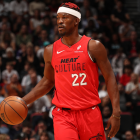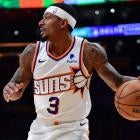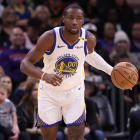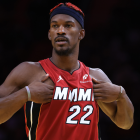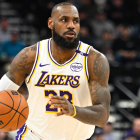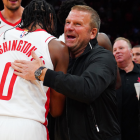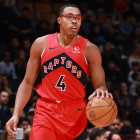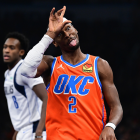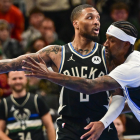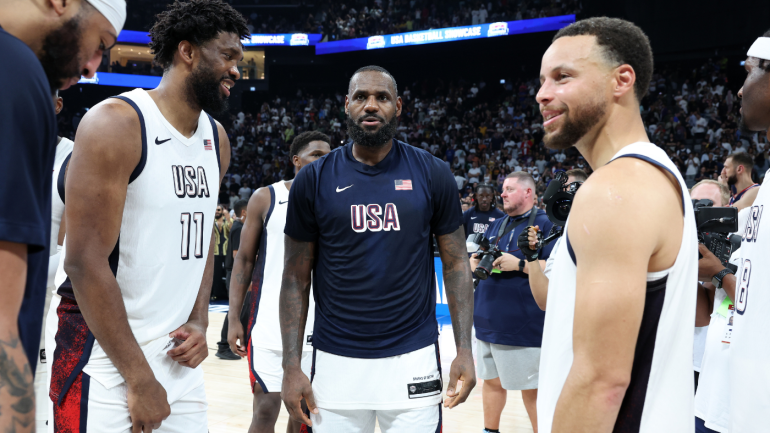
Team USA looked like it was ready to cruise to a gold medal at the Olympics after beating heavyweights Canada, Australia and Serbia in its first three exhibition games by 46 combined points. A nail-biter against upstart South Sudan therefore proved to be an important reminder for the Americans of just how daunting this tournament can be. Everyone can challenge them within a given game. It took a double-digit comeback and a LeBron James layup at the end to seal a victory against what might be the weakest team in the field. Nobody can be taken lightly.
This means that Team USA is going to have to optimize every element of its approach when the games start to count. The schemes, the chemistry, and most importantly, the lineups need to be on point. Team USA can't expect to simply out-talent the field and waltz to an easy gold medal. Team USA has used three starting lineups in four exhibition games thus far (the Americans face Germany on Monday in their final Olympic tune-up), and none have felt quite right. So with the real tournament less than a week away, let's figure out who exactly Team USA should be starting when the Paris games begin.
The no-brainers
LeBron James and Stephen Curry are starting. This probably doesn't need an explanation. They are two of the best players on the team even at the twilight of their careers. They have by far the greatest stature within the sport. No coach would ever feel comfortable telling either of them that they are coming off of the bench, least of all Curry's NBA coach and James' four-time Finals opponent. Frankly, it's hard to imagine either of them signing up to play if coming off of the bench was ever seriously on the table.
Their skill sets are also the least duplicative on the team. Curry is the best shooter on the team. And in the Olympic field. And in the world. And, probably, the universe. More than that, he's by far the most comfortable movement shooter on a team filled with No. 1 options. The perimeter players on this roster are used to handling the ball for the entire game. Having someone like Curry who is at his most valuable without it only enhances everybody else. James is by far the best point guard on the roster. Tyrese Haliburton is the only player on the roster who is his peer as a passer, but Haliburton is smaller and comes with defensive vulnerabilities. In a half-court setting, James remains the team's supreme shot-creator. Everyone on this team can score. Not everyone is going to be able to make their teammates better. That skill is at a premium in this tournament. James and Curry provide it. They are both starting.
The center debate
Let's get this out of the way: Joel Embiid is almost certainly going to be the starting center for Team USA. He, James and Curry have been the three constants in the starting lineup thus far, and Steve Kerr has said that he wants to keep it that way. More than that, Team USA had to go to great lengths to recruit Embiid to play for the Americans in the first place. It's entirely possible that promises were made. Benching Embiid, especially if he was given any assurances that he would start, would risk fracturing the locker room and alienating one of the best players in the world. So in the end, he probably will remain a starter. But we're trying to figure out the best possible Team USA startling lineup. Would that include Embiid?
Well, the answer is probably no. Right now, in a FIBA setting, Anthony Davis is a better player than Joel Embiid. There are circumstantial reasons for that. Embiid doesn't seem to be in great shape after spending most of the second half of the regular season and the postseason injured. FIBA's rules matter here as well. Davis, the far spryer and more athletic of the two, is better-suited to plucking the ball off of the rim and taking advantage of the lack of a three-second rule. Embiid's game hasn't translated in the same way. It's harder to live at the free-throw line in international competition, and defenses are much more aggressive about packing the paint.
Davis would provide at least a measure of continuity to a starting lineup that lacks any of it. He and James are the two longest-tenured NBA teammates on this roster with five total years together as Lakers. The starting lineup makes a bit more sense if it can default to the James-Davis two-man game as its core offense. James, Curry and Embiid all play different ways on offense. The talent is great. The synergy isn't.
But in a way, that works to Embiid's advantage, because he synergizes even less with the reserves. Bench lineups featuring Haliburton, Anthony Edwards, Davis and Bam Adebayo have been stellar in the exhibition games because of their combined athleticism. Davis and Adebayo are turning everything away at the rim. Edwards and Haliburton encourage pace. Team USA has been at its best with those players coming off of the bench. Why mess with one working unit just to try to fix another? Embiid doesn't really fit into the "out-athlete our opponents" approach that has made those lineups so successful.
In the end, though, Davis is still going to be our pick. Embiid has a place here in certain matchups. There is going to be a moment, probably against Serbia, in which Team USA desperately needs a bulkier big man for defense. There are going to be moments in which he is their easiest path to clean buckets against a smaller opponent. But Davis is just a far cleaner fit for FIBA ball than Embiid. Embiid is at his best when a whole roster is built around him. Team USA is too talented for that. Davis, like James and Curry, fits into the greater whole.
The final slots
If Kevin Durant was healthy, he'd get a slot. At this stage, it probably makes more sense to bring him off of the bench. Durant -- who just started practicing after dealing with a calf injury -- is going to need a few tune-up games regardless, and making a change in the middle of the tournament would be less than ideal. So for now, let's assume Durant is the sixth man.
What are we looking for out of these last two slots? The most important trait is going to be perimeter defense. James and Curry aren't really built for high-leverage assignments anymore, at least not across full games, so someone else is going to have to do the defensive dirty work. The obvious choice for one of these slots is Jrue Holiday, who may still be the best perimeter defender in the world. He can defend basically any position, make 3's, and won't interfere with anything else the starters need to do offensively. It's nice to have someone in the starting five who doesn't need plays run for him, so Holiday is an easy fit here.
The tougher question here is who gets the fifth slot. Perimeter defense is still the most valuable trait here, as there is more than enough offense to go around and a James-Davis front-court should still bring in plenty of rebounds. There are two sensible options on the board here: Anthony Edwards and Jayson Tatum.
Tatum is the more natural positional fit. He's a forward. Edwards, Curry and Holiday are guards. But does the positional spectrum really mean much here? Tatum's rebounding would be helpful, but defensively, the guard-wing distinction is probably irrelevant here. Remember, Holiday can guard just about anyone, so there's not a distinct need to start someone purely for the sake of a specific matchup. It also helps that this tournament is stuffed with guards and somewhat limited on wings, especially with Luka Doncic and Slovenia out. There's probably more of a need for guard defenders here, and Edwards is better at that than Tatum, who is best defending bigger forwards.
Edwards would inject a bit more athleticism into a starting five whose other four players are in their 30s. Having more size coming off of the bench unlocks a bit more lineup flexibility as well. Imagine jumbo lineups with Tatum, Durant, Embiid and Adebayo together, for instance. If we're already breaking up the successful, Davis-led bench unit, we might as well create a new one with its own distinct identity out of all of that size.
The starting five
So this leads us to a starting five of James, Curry, Davis, Edwards and Holiday. That's an established NBA pick-and-roll tandem, maybe the NBA's best defender, definitely the NBA's best shooter and one of its supreme up-and-coming athletes. It is balanced with different types of scoring across all five slots and just about every major skill a team needs is covered by at least one of them. There are no guarantees in the Olympics, but this group gives Team USA its best chance at winning gold.









